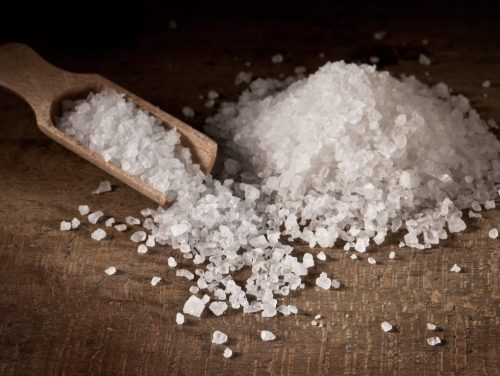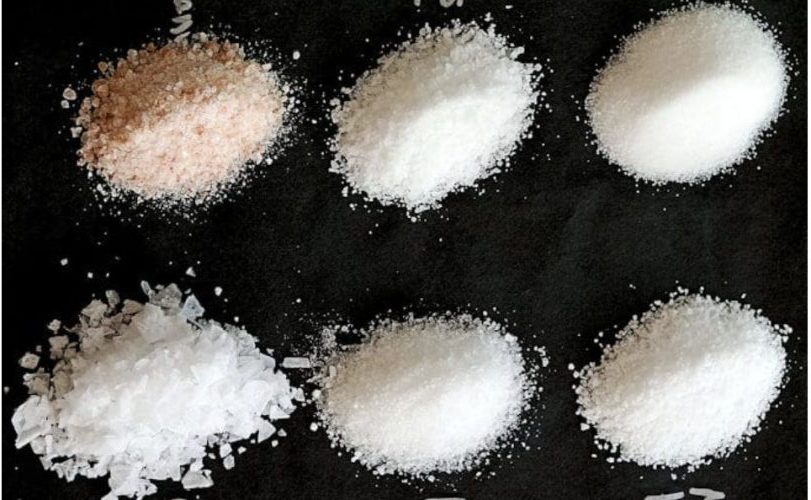Salt is an essential ingredient in cooking and has been used since the beginning of civilization. It is a mineral composed mainly of sodium chloride, which occurs naturally in seawater and salt deposits.
Ground salt refers to salt that has been finely ground for easy use in cooking and seasoning foods. In this article, we will explore the different types of ground salt along with their benefits.
So, What’s Is Ground Salt?

Ground salt is a type of salt that has been processed into fine crystals or powder form for use in cooking, seasoning, and preserving food. This form of salt dissolves quickly and evenly, making it ideal for adding flavor to dishes. The size of the grains can vary depending on how finely the salt is ground.
Salt has played a significant role in human history since ancient times. It was highly valued as a commodity because it was scarce and difficult to obtain before modern mining techniques were developed. The ancient Egyptians used salt to preserve their mummies while the Romans used it as currency.
Salt trade routes were established across continents during medieval times, and many wars were fought over control of these routes. In addition to its economic significance, salt was also essential for preserving food before refrigeration became available.
It was used to cure meats, fish, and vegetables so that they could be stored for long periods without spoiling. In modern times, we continue to rely on this versatile mineral as an integral part of our diet and culinary traditions.
Types of Ground Salt

Ground salt comes in various forms, each with its unique properties and characteristics. The three most popular types are sea salt, Himalayan pink salt, and kosher salt.
Sea Salt
Sea salt is extracted through the evaporation of seawater. It contains essential minerals like magnesium, potassium, and calcium, which are beneficial for the body.
Sea salt is also a good source of iodine that helps support thyroid function and maintain proper hormone levels. There are several varieties of sea salt available in the market today.
Some of them include:
- Fleur de Sel: This type of sea salt is hand-harvested from the surface of seawater. Fleur de Sel has a delicate texture and flavor, making it ideal for garnishing dishes.
- Celtic Sea Salt: This sea salt comes from the coast of Brittany in France. It has a grayish color due to its high mineral content and carries a bold taste that enhances food flavors well.
- Hawaiian Sea Salt: this variety comes from hawaii’s volcanic islands and is known for its red or black hue due to added minerals that give it an earthy taste.
Himalayan Pink Salt
Himalayan pink salt is sourced from ancient seabeds found in the Himalayan Mountains. It’s known for its pinkish hue caused by iron oxide particles present in it.
This type of ground salt carries over 80 minerals beneficial to human health like calcium, iron, zinc among others. Ingesting Himalayan pink salts helps promote healthy digestion since it stimulates stomach acid production hence aiding nutrient absorption while reducing bloating caused by various food sensitivities.
Kosher Salt
Kosher salt is made of larger, coarser crystals than table salt. Its name is derived from its use in the koshering process of meat, where it’s used to draw blood off the flesh. Kosher salt dissolves quickly and evenly, making it ideal for seasoning and brining.
It also has a different taste profile than other salts due to its mineral content. Kosher salt contains little iodine, which is added to other salts as an essential nutrient.
Health Benefits of Ground Salt
Regulates Fluid Balance in the Body
One of the key health benefits of ground salt is its ability to regulate fluid balance in the body. Sodium, a key component of salt, plays an important role in maintaining proper fluid balance and electrolyte levels. When consumed in moderation, sodium can help prevent dehydration and promote healthy bodily functions.
Improves Digestion and Nutrient Absorption
Ground salt can also improve digestion and nutrient absorption by stimulating digestive enzymes and increasing stomach acid production. This aids in breaking down food particles, allowing for better absorption of important vitamins and minerals. Additionally, salt helps maintain the pH balance in the stomach, promoting a healthy environment for digestion.
Enhances Brain Function and Cognitive Performance
Salt is also essential for maintaining proper brain function and cognitive performance. Sodium ions play a critical role in nerve transmission, allowing signals to pass between neurons effectively. Low sodium levels can lead to impaired cognitive function, including decreased attention span and memory retention.
Also check: Pepper: The Essential Spice for Flavorful & Healthy Cooking
Culinary Uses for Ground Salt
Seasoning Meats, Poultry, Fish, Vegetables, and Fruits
Ground salt is widely used as a seasoning agent for meats, poultry, fish vegetables, and fruits. It adds flavor to dishes while also aiding in tenderizing meats by drawing out moisture from them.
Enhancing the Flavor Profile in Baked Goods
Salt is an essential ingredient when it comes to baking goods such as bread or cookies. It helps control fermentation rates while also enhancing flavors by balancing sweetness or bitterness present within recipes.
Creating Brines for Pickling or Curing Foods
Brining involves soaking foods such as meat or vegetables in a mixture of water and salt which imparts flavor while also preserving their freshness. It is a great way to enhance the taste of food while also preserving it for longer periods.
The Risks Associated with Excessive Consumption
High Blood Pressure
While salt has many health benefits when consumed in moderation, excessive consumption can lead to serious health issues such as high blood pressure. This condition puts individuals at risk for heart disease, stroke, and kidney damage.
Kidney Damage
When consumed in excess, salt can cause damage to the kidneys by increasing the workload on these vital organs. Over time, this can lead to a decline in kidney function and an increased risk of developing kidney disease.
Conclusion
Overall, ground salt has a wide range of health benefits when consumed in moderation. It is critical for regulating fluid balance in the body and promoting proper brain function and cognitive performance. Additionally, it enhances flavor profiles in culinary dishes and aids in preserving foods over time.
However, it is important to be mindful of excessive consumption as it can lead to serious health issues such as high blood pressure and kidney damage. To enjoy all the benefits that ground salt has to offer while minimizing risks associated with excessive intake, experts recommend moderate consumption as part of a balanced diet.
1 thought on “The Flavorful and Beneficial World of Ground Salt: Exploring Types, Uses, and Health Benefits”